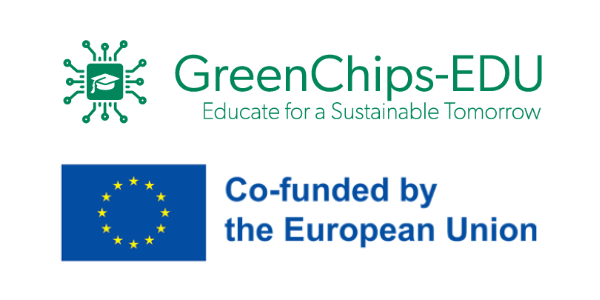High-Tech Meets Circular Economy: The Path to Green Microelectronics
Learn about groundbreaking technologies and materials, expand your skills in life cycle assessment and circular economy in the field of microelectronics, and gain an overview of the macroeconomic and legal context in which electronics companies operate.


Cooperation
This university course is offered in cooperation with the EU co-funded research project GreenChips-EDU.
- Course start: 07 September 2026
- Application deadline: 28 August 2026
- Schedule 2026 (preview)
Information events (online via Webex):
- 17 December 2025, 4:00–5:00 p.m., registration
- 14 January 2026, 4:00–5:00 p.m., registration
Required application documents:
- Completed and signed application form
Please send your application documents by e-mail to: jacqueline.maier@tugraz.at.
- ECTS credit points: 15
- Upon completion: Certificate from TU Graz
- Course language: English
- Standard course fee: EUR 5,200 (VAT-free)
- Subsidised course fee starting Autumn 2025*: EUR 1,900 (VAT-free) based on 5 participants. The course fee will decrease proportionally with a higher number of participants and increase with fewer participants.
* This university course is subsidised as part of the co-financed research project GreenChips-EDU.
No separate application is required; the reduced course fee applies to all participants.
- Syllabus (available in German only)
Content
The university course Green Microelectronics consists of 3 modules each worth 5 ECTS credit points:
- Fundamentals of Microelectronics (5 ECTS)
- Green & Sustainable Microelectronics (5 ECTS)
- Transforming Electronics: Policies & Practices (5 ECTS)
All module content is supplemented with case studies to allow for effective transfer of knowledge and successful implementation at the participant’s own organisation.
The modules are part of the Executive MBA Digital Leadership with a Specialisation in Green Microelectronics. Successful completion of the university course can be credited toward the Executive MBA.
Fundamentals of Microelectronics (5 ECTS)
In this module, participants gain a deeper understanding of semiconductor materials, design processes, and the strategic implications of adopting groundbreaking technologies, including wide-bandgap materials. This module focuses on understanding fundamental aspects of microelectronics and making informed decisions. The key properties of semiconductor devices as well as their design and manufacturing processes are analysed in order to plan and implement strategic steps toward adaption to emerging technologies. In particular, promising technologies such as wide-bandgap materials are discussed, which, in addition to their performance improvements compared to conventional materials, are critical in terms of longevity and sustainability.
Green & Sustainable Microelectronics (5 ECTS)
This module addresses sustainability and the circular economy in relation to microelectronics. Key concepts and theories of sustainability and the circular economy are introduced, along with common challenges associated with the production, use, and disposal of electronic products. Assessment methods such as life cycle assessment, social life cycle assessment, and circular economy assessment are presented and discussed using industrial use cases.
Transforming Electronics: Policies & Practices (5 ECTS)
This module introduces the macroeconomic and legal context in which electronics companies operate. The aim of the module is to sensitise participants to the common constraints of this industry, which are determined by both legal requirements and the structure as well as the social and cultural integration of supply chains and markets.
Target groups and admission
The Green Microelectronics university course is aimed at both graduates and working professionals without prior degrees who want to acquire skills in the field of sustainable microelectronics.
Therefore, no prior academic training is required for participation.
The decision on admission to the university course is made by the academic manager responsible on the basis of the qualifications submitted.
The university course is aimed in particular at following target groups:
- Students and young researchers who wish to understand sustainability in microelectronics and/or research in the field of environmentally friendly semiconductor technologies.
- Engineers and technicians who wish to learn about sustainable production processes, energy-efficient chips, and ways of reducing e-waste.
- Environmental and sustainability experts who are looking to reduce the ecological footprint of microelectronics and/or are interested in “Green IT.”
- Entrepreneurs and start-up founders who aim to develop new business models in green microelectronics.
- Policymakers & NGO staff who are looking to promote sustainable microelectronics initiatives at a policy level.
Contact

Contact
Jacqueline MAIER
B.A. MA
Phone: +43 316 873 4941
jacqueline.maier@tugraz.at
Bernd Deutschmann
Univ.-Prof. Dipl.-Ing. Dr.techn.
Inffeldgasse 12/I
8010 Graz
Bernd.deutschmann@tugraz.at
Institute of Electronics
Inffeldgasse 12
8010 Graz
http://www.ife.tugraz.at/


